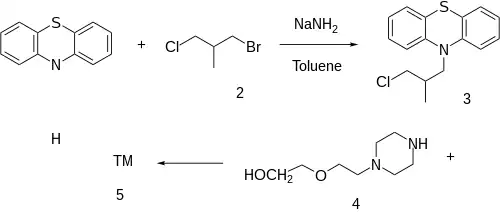Dixyrazine
Dixyrazine, also known as dixypazin (oxalate), sold under the brand names Ansiolene, Esocalm, Esucos, Metronal, and Roscal, is a typical antipsychotic of the phenothiazine group described as a neuroleptic and antihistamine.[2] It was first introduced in Germany in 1969. It is used as a neuroleptic, anxiolytic, and antihistamine in doses between 12.5 and 75 mg a day.
 | |
| Names | |
|---|---|
| IUPAC name
(RS)-2-[2-[4-(2-methyl-3-phenothiazin-10-ylpropyl)piperazin-1-yl]ethoxy]ethanol | |
| Other names
UCB-3412 | |
| Identifiers | |
3D model (JSmol) |
|
| ChemSpider | |
| ECHA InfoCard | 100.017.811 |
| EC Number |
|
| KEGG | |
PubChem CID |
|
| UNII | |
CompTox Dashboard (EPA) |
|
| |
| |
| Properties | |
| C24H33N3O2S | |
| Molar mass | 427.60272 g/mol |
| Pharmacology | |
| N05AB01 (WHO) | |
| Legal status | |
Except where otherwise noted, data are given for materials in their standard state (at 25 °C [77 °F], 100 kPa).
Infobox references | |
Synthesis
Sodamide alkylation of phenothiazine (1) with 1-bromo-3-chloro-2-methylpropane [6974-77-2] (2) gives 10-(3-Chloro-2-methylpropyl)phenothiazine, CID:12299119 (3). Completion of the sidechain by alkylation with 1-[2-(2-Hydroxyethoxy) Ethyl]Piperazine [13349-82-1] (4) and displacement of the halogen completes the synthesis of Dixyrazine (5).
References
- Anvisa (2023-03-31). "RDC Nº 784 - Listas de Substâncias Entorpecentes, Psicotrópicas, Precursoras e Outras sob Controle Especial" [Collegiate Board Resolution No. 784 - Lists of Narcotic, Psychotropic, Precursor, and Other Substances under Special Control] (in Brazilian Portuguese). Diário Oficial da União (published 2023-04-04). Archived from the original on 2023-08-03. Retrieved 2023-08-16.
- J. Elks (14 November 2014). The Dictionary of Drugs: Chemical Data: Chemical Data, Structures and Bibliographies. Springer. pp. 462–. ISBN 978-1-4757-2085-3.
- Henri Morren, GB861420 (1961).
This article is issued from Wikipedia. The text is licensed under Creative Commons - Attribution - Sharealike. Additional terms may apply for the media files.
